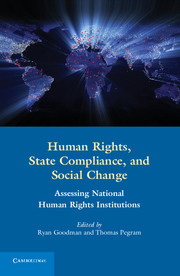Book contents
- Frontmatter
- Contents
- Contributors
- Preface
- 1 Introduction
- PART I NHRIs in Theory and Reality
- PART II NHRI Performance
- 5 National Human Rights Institutions and the International Human Rights System
- 6 National Human Rights Institutions in Anglophone Africa
- 7 National Human Rights Institutions in the Asia Pacific Region
- 8 National Human Rights Institutions in Central and Eastern Europe
- 9 National Human Rights Institutions in Latin America
- PART III NHRIs and Compliance
- PART IV Final Reflections
- Annex 1
- Index
- References
6 - National Human Rights Institutions in Anglophone Africa
Legalism, Popular Agency, and the “Voices of Suffering”
from PART II - NHRI Performance
Published online by Cambridge University Press: 05 June 2012
- Frontmatter
- Contents
- Contributors
- Preface
- 1 Introduction
- PART I NHRIs in Theory and Reality
- PART II NHRI Performance
- 5 National Human Rights Institutions and the International Human Rights System
- 6 National Human Rights Institutions in Anglophone Africa
- 7 National Human Rights Institutions in the Asia Pacific Region
- 8 National Human Rights Institutions in Central and Eastern Europe
- 9 National Human Rights Institutions in Latin America
- PART III NHRIs and Compliance
- PART IV Final Reflections
- Annex 1
- Index
- References
Summary
Introduction
This chapter is grounded in a study of three of the national human rights institutions (NHRIs) that operate in “Anglophone Africa.” In the main, it focuses on two objectives. The first goal is to understand the performance of the relevant NHRIs in terms of the extent of their legalism; facilitation of their own deployment and utilization by civil society agents; and attentiveness to the “voices of suffering” in whose interest they ought to function. As explained in this chapter, these three factors together constitute a more holistic way of understanding NHRI effectiveness, beyond the usual “measures.” The second main objective of the chapter is to probe for more general conceptual insights into the behavior, performance, and promise of these institutions and elaborate upon what these findings tell (or do not tell) us about NHRIs in Anglophone Africa.
Methodologically, it is important to note that the particular Anglophone African NHRIs studied here are the Nigerian, South African, and Ugandan bodies. Each NHRI is chosen from one of the three geographical regions of the African continent where Anglophone countries exist – West Africa, Southern Africa, and East Africa (in that order). There are no North or Central African Anglophone countries. The temporal scope of the study is the decade between 1999 and 2009. The evidence on which the chapter is based was collected through a desk study, consisting of both a review of secondary sources and transcribed telephone interviews with NHRI officials and NGO activists in the relevant countries. The interviews focused on these actors because they are the best placed to comment on work of the NHRIs in their countries, and comparing the evidence supplied by one with the others ensured that a more accurate picture of the relevant NHRI’s performance was obtained. It is recognized, however, that there are limits to what a study of only three NHRIs can tell us about the thirteen or so NHRIs that exist in Anglophone Africa. Yet, as the three NHRIs studied here have been purposively selected from each of the three regions of Anglophone Africa, they suffice for the purposes of the current chapter.
- Type
- Chapter
- Information
- Human Rights, State Compliance, and Social ChangeAssessing National Human Rights Institutions, pp. 124 - 149Publisher: Cambridge University PressPrint publication year: 2011



